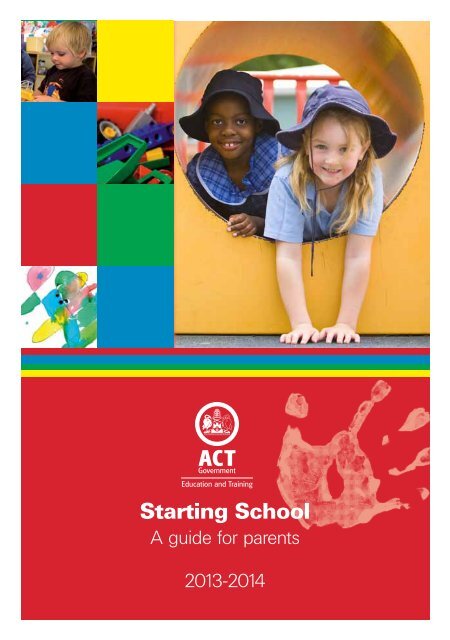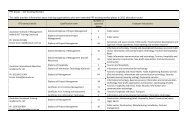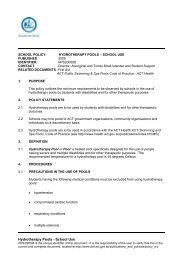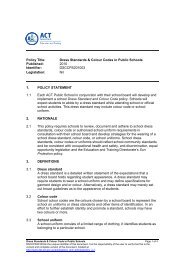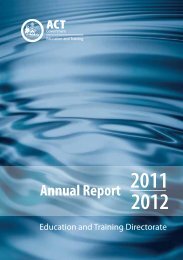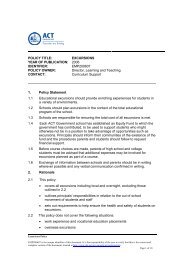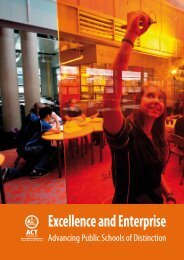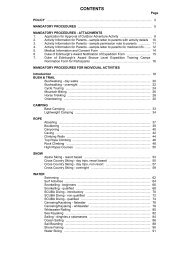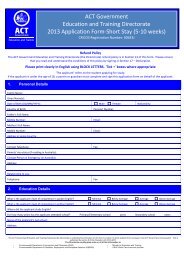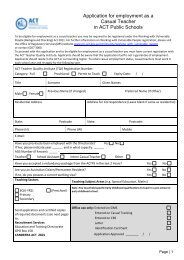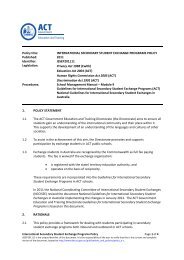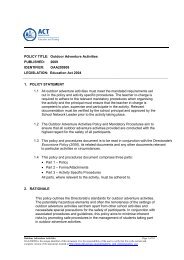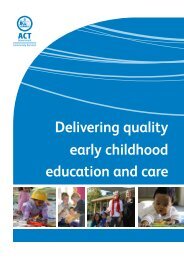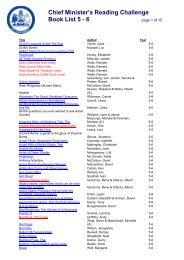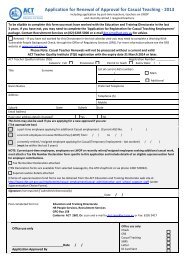Starting School Guide - Education and Training Directorate - ACT ...
Starting School Guide - Education and Training Directorate - ACT ...
Starting School Guide - Education and Training Directorate - ACT ...
Create successful ePaper yourself
Turn your PDF publications into a flip-book with our unique Google optimized e-Paper software.
<strong>Starting</strong> <strong>School</strong><br />
A guide for parents<br />
2013-2014
<strong>Starting</strong> <strong>School</strong><br />
This guide for parents <strong>and</strong> carers has useful <strong>and</strong> important information for<br />
preparing your son or daughter as they embark on, <strong>and</strong> throughout, their formal<br />
schooling. This booklet also contains a list of helpful websites <strong>and</strong> contact<br />
numbers should you require further information.
Contents<br />
Getting ready for school 1<br />
The first day at school 2<br />
Getting to school safely 3<br />
Road safety <strong>and</strong> walking 3<br />
A healthy breakfast <strong>and</strong> lunch 3<br />
<strong>School</strong> canteens 4<br />
Food allergies 4<br />
Tips for school lunches 4<br />
Enrolling in school 5<br />
Attending school 6<br />
Voluntary contributions 6<br />
Uniforms <strong>and</strong> colour code 6<br />
Sun protection <strong>and</strong> preparing for hot days 6<br />
Head lice 7<br />
Student behaviour <strong>and</strong> school discipline procedures 7<br />
Policies <strong>and</strong> guidelines 7<br />
<strong>ACT</strong> public schools 7<br />
<strong>Education</strong> for the 21st Century 8<br />
Evaluating your child’s progress 8<br />
Performance Indicators in Primary <strong>School</strong>s (PIPS) 9<br />
Additional assistance programs 9<br />
Term dates <strong>and</strong> events 10<br />
Contact details <strong>and</strong> web sites 11
<strong>Starting</strong> school<br />
<strong>Starting</strong> school can be a stressful<br />
time for young children. <strong>School</strong>s can<br />
sometimes be confronting places with<br />
lots of children of different ages <strong>and</strong><br />
new routines to learn. Your son or<br />
daughter needs lots of support from you<br />
before they start school <strong>and</strong> especially<br />
in the first few weeks.<br />
Labelling of belongings<br />
Label all your child’s belongings<br />
<strong>and</strong> check for special requirements<br />
such as a library bag <strong>and</strong> art shirt or<br />
smock. Encourage your child to dress<br />
themselves so they can manage things<br />
like taking jumpers or coats on <strong>and</strong> off<br />
at school.<br />
Help them with going to the toilet by<br />
themselves <strong>and</strong> ensure they are able to<br />
make their needs known to the teacher.<br />
Accidents can happen so a change<br />
of underwear can help your school<br />
manage the accident with the least<br />
amount of fuss.<br />
Parentlink is an <strong>ACT</strong> Government service<br />
which provides a range of information to<br />
assist parents <strong>and</strong> carers with nurturing<br />
<strong>and</strong> supporting children. A range of<br />
Parent <strong>Guide</strong>s are available from schools<br />
<strong>and</strong> the Parentlink website<br />
www.parentlink.act.gov.au providing<br />
easy-to-read information on issues from<br />
birth through to teens.<br />
4
Getting ready for school<br />
It is common for children, <strong>and</strong> their parents, to be a little anxious about starting school.<br />
To reduce any uncertainty it is helpful before starting school to familiarise your child with the<br />
school <strong>and</strong> their teacher before they start <strong>and</strong> encourage them by focusing on the benefits of<br />
interesting new experiences <strong>and</strong> friendships. Consider developing a school day routine <strong>and</strong><br />
practise getting ready for school. This routine will involve a set bedtime to ensure your child has<br />
enough sleep <strong>and</strong> a morning routine of getting dressed in the school uniform <strong>and</strong> packing their<br />
school bag.<br />
<strong>School</strong> websites also provide information about specific programs <strong>and</strong> advice for parents. A<br />
complete listing of schools, with contact details <strong>and</strong> website addresses, is available from the<br />
<strong>Directorate</strong>’s website.<br />
1
The first day of school<br />
So your child’s first day is as enjoyable as possible ensure your family is prepared <strong>and</strong> allow time<br />
for your child to eat a balanced breakfast. Arrive at school well before the first class or activity so<br />
they have time to become settled. To help them to become secure, be positive <strong>and</strong> reassuring.<br />
Demonstrate your trust in the teacher <strong>and</strong> your enthusiasm about school <strong>and</strong> learning.<br />
Once your child is settled into school, a short <strong>and</strong> reassuring goodbye encourages independence.<br />
You should tell your son or daughter when you leave. Be guided by your child’s teacher who<br />
will use a number of strategies so that the first day is as stress-free as possible for students <strong>and</strong><br />
parents!<br />
2
A healthy breakfast<br />
<strong>and</strong> lunch<br />
Getting to school safely<br />
It is vital that your child begins their day<br />
with a nutritious breakfast. Participation<br />
in school activites will burn up their<br />
energy <strong>and</strong> a hungry child will lose<br />
concentration <strong>and</strong> become tired. Useful<br />
information for parents on how to<br />
provide a healthy breakfast is available<br />
from The Raising Children Network<br />
website raisingchildren.net.au. Specific<br />
dietary advice is also available from the<br />
Dietitians Association of Australia.<br />
It is important that your child is at school before<br />
the starting time each day. A parent or carer also<br />
needs to collect children promptly at the end of the<br />
school day so that they do not become anxious.<br />
Before <strong>and</strong> after school care may be available at<br />
your school <strong>and</strong> you can discuss this with the<br />
school.<br />
Road safety <strong>and</strong> walking<br />
<strong>School</strong>s can be busy traffic environments as<br />
parents take children to school <strong>and</strong> pick them up at<br />
the end of the school day. Drivers need to ensure<br />
they abide by the traffic rules <strong>and</strong> car parking<br />
arrangements. Be aware of school buses <strong>and</strong> park<br />
on the same side of the road as the bus. Parking<br />
on the opposite side can be dangerous as children<br />
will be tempted to rush out from behind a bus<br />
to cross the road. Ensure that properly adjusted<br />
seatbelts are worn <strong>and</strong> be especially careful when<br />
reversing your vehicle.<br />
As children become old enough to walk to school,<br />
parents need to consider the route to school <strong>and</strong><br />
likely road crossings. Road safety needs to be<br />
taught to children <strong>and</strong> reinforced by parents setting<br />
a good example. Educate your child about not<br />
accepting gifts or lifts from someone they do not<br />
know.<br />
Some schools organise a ‘walking bus’ where<br />
children walking to <strong>and</strong> from school can join a<br />
group of other school children <strong>and</strong> a responsible<br />
adult. The ‘bus’ picks up children along a<br />
designated route. Your school will have more<br />
information if you are interested.<br />
Children at ages five <strong>and</strong> six –<br />
Dr John Irvine<br />
‘These kids still have their lovely<br />
imagination but their ego has settled<br />
<strong>and</strong> they’re now keen to make others<br />
feel good. If you capitalise on their thirst<br />
to be told they’re good then you can<br />
develop the most adorable kids.<br />
Their behaviour can be reinforced even<br />
by abstract symbols of parental approval,<br />
such as stars or stamps <strong>and</strong> their<br />
behaviour can be shaped by consistently<br />
reinforcing behaviour you want <strong>and</strong><br />
consistently punishing behaviour you<br />
don’t. Because they believe in their<br />
world, things that shatter that faith<br />
hurt hard. If a dog is nasty to them or<br />
somebody hurts them then they can<br />
wear the scars for a long time.’<br />
An excerpt from Who’d be a parent? The<br />
manual that should have come with the<br />
kids! Dr John Irvine<br />
3
<strong>School</strong> canteens<br />
Healthy eating is encouraged in <strong>ACT</strong><br />
public schools. <strong>School</strong> canteens<br />
promote <strong>and</strong> provide healthy food <strong>and</strong><br />
beverages <strong>and</strong> limit the sale of foods<br />
<strong>and</strong> drinks high in fat, sugar <strong>and</strong> salt,<br />
such as cakes, chips or lollies. <strong>School</strong>s<br />
welcome parents volunteering their time<br />
to assist with school canteens.<br />
Food allergies<br />
It is vital you let your school know if your<br />
child is allergic to certain food groups<br />
such as nuts. Anaphylaxis is a severe<br />
allergic reaction to certain foods <strong>and</strong><br />
many schools have adopted an ‘allergy<br />
friendly’ approach. These schools will<br />
not have nut products available from the<br />
canteen. As children sometimes like to<br />
share their lunches, their schools may<br />
also request parents to provide lunches<br />
free of nuts or nut products such as<br />
‘Nutella’ <strong>and</strong> peanut butter.<br />
Tips for school<br />
lunches<br />
• Organise food <strong>and</strong> drink according<br />
to the timetabled breaks <strong>and</strong> explain<br />
to your child that snack items are for<br />
the morning break <strong>and</strong> lunch items<br />
for the longer break.<br />
• Let your child help prepare healthy<br />
lunches <strong>and</strong> snacks.<br />
• Pack food that is ready <strong>and</strong> easy to<br />
eat <strong>and</strong> not too messy. Pre-cut items<br />
such as oranges, celery <strong>and</strong> carrot<br />
are ideal.<br />
• Use a lunch box that keeps food<br />
cool <strong>and</strong> ensure all items are clearly<br />
labelled.<br />
• Ensure your child is able to open<br />
containers such as cans or plastic<br />
tubs.<br />
• Try different types of breads, rolls or<br />
muffins for variety.<br />
• Limit sweets, chips <strong>and</strong> treats.<br />
• Water could be flavoured with a slice<br />
of lemon or orange.<br />
4
Enrolling in school<br />
In the <strong>ACT</strong> it is compulsory for children to be enrolled in school from age six. All young people<br />
are required to participate in full-time education until they complete a year 10 program of study<br />
<strong>and</strong> then participate full-time in education, training or employment until completing year 12 or<br />
equivalent, or reaching age 17, whichever occurs first.<br />
Please contact the school in your area or the schools network—North Gungahlin <strong>and</strong> Belconnen<br />
on 6205 3313 <strong>and</strong> South-Weston <strong>and</strong> Tuggeranong on 6205 5428.<br />
5
Attending school<br />
It is important for your child to attend school<br />
each day for their intellectual development. In<br />
particular, it assists their reading, writing <strong>and</strong><br />
numeracy skills development, as well as their<br />
social, emotional <strong>and</strong> physical development.<br />
Playing with peers is important for a child’s social<br />
<strong>and</strong> emotional development as they learn to get<br />
along with others <strong>and</strong> learn what is acceptable<br />
behaviour. In the early years of schooling children<br />
need opportunities to practise these skills, test<br />
new ideas <strong>and</strong> negotiate with other children. As<br />
parents know, there will be disagreements between<br />
children <strong>and</strong> friendships will be made <strong>and</strong> some<br />
will break up. The teacher will assist your child to<br />
deal with conflict <strong>and</strong> will appreciate being told of<br />
any circumstances you are aware of that may be<br />
affecting your child.<br />
Your child will be excused from school if they are<br />
sick or have a temporary medical condition that<br />
prevents them from attending. Your child may also<br />
be excused from attending school by the principal<br />
if they have an infectious or contagious illness or an<br />
infestation of head lice. You must tell the school if<br />
your child will be away <strong>and</strong> if your child is absent<br />
provide a reasonable explanation for the absence,<br />
preferably in writing.<br />
Voluntary contributions<br />
Public education is free. <strong>School</strong>s may offer or<br />
facilitate some specific optional items, activities<br />
<strong>and</strong> services for which parents may be required to<br />
pay if they want their child to access them. Such<br />
activities <strong>and</strong> items could include: non-essential<br />
school camps <strong>and</strong> excursions, class photos, the<br />
canteen, private tutoring <strong>and</strong> uniforms. Student<br />
support funds are maintained in all public schools<br />
to support the needs of students who might not<br />
otherwise be in a position to take advantage of the<br />
opportunities provided by their schools.<br />
Uniforms <strong>and</strong><br />
colour code<br />
The school uniform or colour code<br />
is determined by the school board.<br />
The school’s dress code policy <strong>and</strong><br />
guidelines are available from the school’s<br />
h<strong>and</strong>book or website.<br />
Sun protection <strong>and</strong><br />
preparing for hot<br />
days<br />
Much of the damage to a child’s skin<br />
occurs in childhood <strong>and</strong> adolescence<br />
from exposure to the sun. <strong>ACT</strong> public<br />
schools encourage children to play in<br />
shady areas <strong>and</strong> ask parents to ensure<br />
children wear appropriate clothing<br />
including a hat. Most schools will<br />
enforce a ‘no hat, no play policy’ <strong>and</strong><br />
the regular use of broad spectrum water<br />
resistant SPF 30+ sunscreen on exposed<br />
skin when students are exposed to the<br />
sun.<br />
Canberra can experience quite hot days<br />
in summer <strong>and</strong> schools will take steps<br />
on these days to ensure children do not<br />
get too hot <strong>and</strong> have access to water.<br />
Parents may also like to pack extra water<br />
bottles.<br />
6
Student behaviour<br />
<strong>and</strong> school discipline<br />
procedures<br />
Head lice<br />
Head lice are a very common problem.<br />
Head lice are only found on the human<br />
head <strong>and</strong> are not found in furnishings<br />
or classroom carpets. If an outbreak of<br />
head lice does occur at school it can be<br />
annoying but not harmful to your child’s<br />
health. However to avoid an outbreak<br />
across a class of students, schools will<br />
request parents to remove <strong>and</strong> treat<br />
children with evidence of head lice.<br />
A useful head lice fact sheet on how to<br />
treat head lice is available from the <strong>ACT</strong><br />
Health website.<br />
Children do best at school when<br />
their parents <strong>and</strong> teachers work<br />
together <strong>and</strong> support each other.<br />
<strong>School</strong>s have a range of approaches to reinforce<br />
the good behaviour measures taught by parents.<br />
For students in the early years the focus will be<br />
on learning to work cooperatively with others <strong>and</strong><br />
to follow instructions from the teacher. This will<br />
include learning to walk into class in an orderly way<br />
<strong>and</strong> to put their h<strong>and</strong> up to speak in class.<br />
Teachers will outline the rules of the classroom to<br />
students <strong>and</strong> the consequences of not following<br />
teacher directions, being disruptive in class or<br />
behaviour that is likely to be harmful to others.<br />
If there has been a disruption to the class <strong>and</strong><br />
student learning, the teacher will quickly take<br />
action <strong>and</strong> ensure students underst<strong>and</strong> why certain<br />
actions are unacceptable.<br />
Policies <strong>and</strong> guidelines<br />
The <strong>Education</strong> <strong>and</strong> <strong>Training</strong> <strong>Directorate</strong> provides<br />
policy advice to <strong>ACT</strong> public schools. This is<br />
available from the <strong>Directorate</strong> website or from your<br />
school. Each school also has a range of policy<br />
guidelines providing advice on how the school is<br />
conducted. These are often found on the school’s<br />
website or are available from the front office.<br />
<strong>ACT</strong> public schools<br />
Each school has a school board as part of its<br />
governance structure to establish <strong>and</strong> monitor<br />
school strategic directions <strong>and</strong> policies. Typically<br />
school boards have three parent representatives<br />
nominated by the school’s Parents <strong>and</strong> Citizens<br />
Association. Parents are encouraged to consider<br />
becoming a part of the association <strong>and</strong> schools<br />
welcome parents volunteering their time <strong>and</strong><br />
skills to support the school. <strong>School</strong>s regularly<br />
communicate with parents about school programs<br />
<strong>and</strong> activities through the school newsletter.<br />
The <strong>ACT</strong> <strong>Education</strong> <strong>and</strong> <strong>Training</strong> <strong>Directorate</strong> website<br />
www.det.act.gov.au provides further information on<br />
<strong>ACT</strong> public schools, public education services <strong>and</strong><br />
programs <strong>and</strong> contact details.<br />
7
<strong>Education</strong> for the<br />
21st Century<br />
The <strong>ACT</strong> Government has committed significant levels<br />
of funding to public schools in recent years to develop<br />
<strong>and</strong> extend a number of programs to ensure your child<br />
will have the best possible foundations for learning.<br />
This has included a renewal of school curriculum<br />
across all <strong>ACT</strong> schools so what is taught is relevant<br />
<strong>and</strong> important for children to know, underst<strong>and</strong> <strong>and</strong><br />
gain those skills which will equip them for lifelong<br />
learning in the 21st Century.<br />
In recognition of the importance of the earliest years<br />
of a child’s learning, the <strong>ACT</strong> Government has opened<br />
four early childhood schools – Isabella Plains, Southern<br />
Cross (Scullin), Narrabundah <strong>and</strong> Lyons – <strong>and</strong> will<br />
open another in Franklin in 2013. These schools<br />
provide integrated services for children<br />
aged 0-8 years <strong>and</strong> their families.<br />
All preschools are amalgamated with their local<br />
primary school allowing teachers to share their<br />
expertise on early learning to better meet the needs of<br />
all young children.<br />
Your child will participate in a range of programs<br />
to develop their intellectual, emotional, social <strong>and</strong><br />
physical skills to help them realise their potential.<br />
A typical school day will involve a variety of activities<br />
such as physical exercise, reading <strong>and</strong> writing tasks,<br />
learning about numbers, shapes <strong>and</strong> patterns, science<br />
<strong>and</strong> how things work, art <strong>and</strong> music activities, visiting<br />
the library <strong>and</strong> using information technologies.<br />
Developing your child’s literacy <strong>and</strong> numeracy skills will<br />
be a key focus across all learning areas as these skills<br />
are the essential platform for their future success.<br />
The teacher will provide a range of lesson experiences<br />
to challenge <strong>and</strong> stimulate your child’s learning while<br />
supporting them to meet their individual needs in<br />
becoming confident learners.<br />
Evaluating your<br />
child’s progress<br />
Effective teaching <strong>and</strong> learning requires<br />
a collaborative partnership between<br />
parents <strong>and</strong> teachers. Teachers will<br />
advise you of the progress your child is<br />
making <strong>and</strong> how you can assist them to<br />
follow up their class work at home.<br />
Your child’s teacher will assess how<br />
your child is progressing individually <strong>and</strong><br />
also in relation to other children. Your<br />
school will provide written reports at<br />
least twice a year advising you of your<br />
child’s progress. These reports will also<br />
indicate areas for further development.<br />
Regular parent/teacher meetings occur<br />
throughout the school year so that you<br />
can discuss with the teacher your son’s<br />
or daughter’s achievement <strong>and</strong> progress.<br />
Parents may also choose to make an<br />
appointment with the class teacher<br />
during the school term.<br />
It is important that you show how<br />
excited you are about your child’s<br />
learning by asking your child about<br />
their day. You could ask them what<br />
books they read, what words they<br />
know, or what songs <strong>and</strong> rhymes<br />
they have learnt.<br />
8
Performance<br />
Indicators in<br />
Primary <strong>School</strong>s<br />
(PIPS)<br />
In kindergarten, the Performance<br />
Indicators in Primary <strong>School</strong>s (PIPS)<br />
program, conducted at the beginning<br />
<strong>and</strong> end of the year, will assess your<br />
child’s literacy <strong>and</strong> numeracy skills.<br />
This test is also used by a number of<br />
countries <strong>and</strong> by individual schools<br />
across Australia. The program helps<br />
teachers to plan appropriate programs<br />
for students who are not achieving<br />
the expected st<strong>and</strong>ards. The first<br />
assessment will take place within the<br />
first month of school <strong>and</strong> there is no<br />
preparation necessary. Your child’s<br />
school report to you will be based<br />
largely on the PIPS assessment.<br />
Additional assistance<br />
programs<br />
Some children require additional support. The<br />
<strong>ACT</strong> Government provides support services for<br />
Aboriginal <strong>and</strong> Torres Strait Isl<strong>and</strong>er students, those<br />
for whom English is their second language, <strong>and</strong><br />
students with a disability. Further advice on English<br />
as a second language support is available from<br />
your school. For information about Aboriginal <strong>and</strong><br />
Torres Strait Isl<strong>and</strong>er education support programs or<br />
the Koori Preschool Program contact the Aboriginal<br />
<strong>and</strong> Torres Strait Isl<strong>and</strong>er <strong>Education</strong> section on<br />
6205 9189 or go to Indigenous <strong>Education</strong> on the<br />
<strong>Directorate</strong>’s website.<br />
<strong>ACT</strong> public schools provide a range of support<br />
programs for students with a disability. If your child<br />
has special needs please make an appointment<br />
to talk with the principal as early as possible. The<br />
school can then help make arrangements for your<br />
child. Information is available from Student Services<br />
in the <strong>Education</strong> <strong>and</strong> <strong>Training</strong> <strong>Directorate</strong> on<br />
6205 7029.<br />
Students with a disability may require additional<br />
programs from specialists in other areas. Therapy<br />
<strong>ACT</strong> is a free government service that provides<br />
a multidisciplinary therapy <strong>and</strong> support service<br />
for people with disabilities <strong>and</strong> delays in their<br />
development aged from birth to 65 years of<br />
age. Therapy <strong>and</strong> support services are available<br />
for physiotherapy, occupational therapy, speech<br />
pathology, social work <strong>and</strong> psychology. Information<br />
is available from Student Services or the Disability<br />
<strong>Education</strong> section of the <strong>Directorate</strong>’s website.<br />
9
Term dates <strong>and</strong> events<br />
<strong>School</strong>s are closed for all public holidays including Canberra Day on 11 March 2013 <strong>and</strong><br />
10 March 2014. New students start school on the Monday of Term 1, with all continuing<br />
students returning on Tuesday. Term dates for <strong>ACT</strong> schools for 2013 <strong>and</strong> 2014 are as follows:<br />
2013<br />
Term 1 – Friday 1 February to<br />
Friday 12 April<br />
Term 2 – Monday 29 April to<br />
Friday 5 July<br />
Term 3 – Monday 22 July to<br />
Friday 27 September<br />
Term 4 – Monday 14 October to<br />
Friday 20 December<br />
2014<br />
Term 1 – Friday 31 January to<br />
Friday 11 April<br />
Term 2 – Monday 28 April to<br />
Friday 4 July<br />
Term 3 – Monday 21 July to<br />
Friday 26 September<br />
Term 4 – Monday 13 October to<br />
Wednesday 17 December<br />
10
Contact details <strong>and</strong> web sites<br />
Helpful Phone Numbers<br />
<strong>ACT</strong> Council of Parents & Citizens<br />
Associations Inc.<br />
6241 5759 or email parents@canberra.net.au<br />
<strong>ACT</strong> <strong>Education</strong> <strong>and</strong> <strong>Training</strong> <strong>Directorate</strong><br />
13 22 81 (6207 0494 TTY)<br />
Canberra Connect<br />
13 22 81 (6207 0494 TTY)<br />
Emergency – Police, Fire, Ambulance<br />
000<br />
Calvary Hospital<br />
62016111<br />
Carers <strong>ACT</strong>: Northside | Southside<br />
6296 9900 | 6232 4270<br />
Canberra Hospital<br />
6244 2222<br />
Canberra Preschool Society<br />
6286 2527<br />
or email canberrapreschools@bigpond.com<br />
Child Abuse Prevention Service<br />
1800 688 009<br />
Citizens Advice Bureau <strong>ACT</strong><br />
6248 7988<br />
Crime Stoppers<br />
1800 333 000 (8am-9pm)<br />
Domestic Violence Crisis Service<br />
6280 0900 (6247 1657 TTY)<br />
Health First<br />
6207 7777 (6207 7770 TTY)<br />
Kids Helpline<br />
1800 551 800<br />
Lifeline<br />
13 11 14<br />
Mental Health Crisis Team<br />
1800 629 354<br />
ParentLink<br />
13 34 27 (6205 8800) (Mon-Fri 8:30am–5pm)<br />
Poisons Information Centre<br />
13 11 26<br />
Police Assistance<br />
13 14 44<br />
Helpful Web Sites<br />
<strong>ACT</strong> Council of Parents & Citizens<br />
Associations Inc.<br />
www.schoolparents.canberra.net.au<br />
<strong>ACT</strong> <strong>Education</strong> <strong>and</strong> <strong>Training</strong> <strong>Directorate</strong><br />
www.det.act.gov.au<br />
<strong>ACT</strong> Government<br />
www.act.gov.au<br />
Citizens Advice Bureau <strong>ACT</strong><br />
www.citizensadvice.org.au<br />
Canberra Connect<br />
www.canberraconnect.act.gov.au<br />
Canberra Preschool Society<br />
www.canberrapreschools.org<br />
Parentlink<br />
www.parentlink.act.gov.au<br />
Safe <strong>School</strong>s<br />
www.bullyingnoway.com.au<br />
<strong>School</strong>s<br />
www.det.act.gov.au<br />
Sun Smart<br />
www.sunsmart.com.au<br />
11
12/0514 Publishing Services


